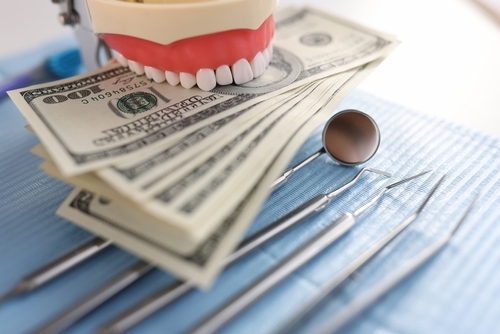When considering a big life decision, such as a medical or dental procedure, you need to know that the result will be worth the cost. After all, if you incur a significant expense, you want to see a big impact. Years of experience have taught us that dental implants offer substantial benefits when it comes to tooth replacement. And now, dental implants have the potential to be tax deductible, allowing you to offset some of the cost of this transformative procedure.
Mini Dental Implants, Big Oral Health Benefits
 For decades, dental implants have been a tried-and-true option for replacing teeth. They provide reliable results, connecting artificial teeth firmly to the jawbone. This system makes implant-supported solutions, such as crowns, bridges, and implant dentures, much more stable, functional, and durable than traditional options.
For decades, dental implants have been a tried-and-true option for replacing teeth. They provide reliable results, connecting artificial teeth firmly to the jawbone. This system makes implant-supported solutions, such as crowns, bridges, and implant dentures, much more stable, functional, and durable than traditional options.
While traditional dental implants are an effective solution, they aren’t suitable for everyone. Mini dental implants are a smaller, sleeker version. They are just as durable while being less invasive. Their toothpick-sized diameter allows us to place them without incisions or stitches and significantly reduces the healing time. Thanks to their narrow width, Dr. Bradford can place mini implants in patients with less jawbone density. He can also insert the implants in the jawbone and load them with new teeth on the same day.
Price is another significant advantage that mini implants have over conventional implants. Because the process is much more streamlined, mini implants are more affordable than their larger counterparts. They are just as effective for tooth replacement but at a fraction of the size and cost.
How Are Dental Implants Tax Deductible?
While mini dental implants are a cost-effective alternative to traditional implants, overall treatment costs are an important consideration for many patients. If your insurance doesn’t offer coverage for dental implants or provides partial coverage, it can be helpful to know that dental implants qualify as a tax deductible medical expense.
According to IRS Publication 502, you can deduct specific unreimbursed medical and dental costs. “False teeth,” including dental implants, qualify as an eligible expense. The IRS allows you to deduct costs that are over 7.5% of your Adjusted Gross Income (AGI).
If you’re considering itemizing your deductions on your tax return, you’ll need to determine the following:
- The amount of your dental implant procedure costs you paid and any other qualifying medical expenses for the year. Expenses covered by insurance or paid for with a health savings account are NOT eligible.
- Your Adjusted Gross Income (AGI). This can be found on Line 11 of Form 1040 or by adding all your income and subtracting certain adjustments.
- 7.5% of your AGI. Any eligible medical or dental expenses exceeding this amount can be deducted.
You should have a basic understanding of itemizing your tax deductions. If you’re unfamiliar with this process, we recommend consulting with a tax professional.
How to Determine Your Deduction
You’ll first need to calculate 7.5% of your AGI to determine your minimum threshold. Only expenses that exceed this minimum threshold are eligible to count as deductions. For example, if your AGI was $50,000, the minimum threshold would be $3,750, and only your expenses beyond that number can be deducted. In this example, if you paid $19,000 in medical and dental expenses, then you can write off $15,250 ($19,000 – $3,750 = $15,250).
If you have significant medical expenses or other qualifying deductions, itemizing your tax return can help lower your taxable income, potentially reducing the taxes you owe or increasing your refund.
Other Financial Options
When it comes to paying for dental implants, our practice offers several flexible options to help you afford your treatment. We will work with your dental insurance provider to get the most out of your coverage, but many providers consider dental implants a cosmetic procedure. If financing is required, we can provide a soft credit check. It won’t affect your credit score, but it will let you know where you stand with our multiple outside lending partners so you can find a payment plan that works for your family’s budget.
Get More From Tax Deductible Dental Implants
There’s good news if concerns about cost have made you hesitate to consider dental implants. Thanks to the potential tax benefits of dental implants, you may have a new way to manage the expense of this important procedure.
If you need to replace missing teeth, we invite you to schedule a FREE consultation with our office. Dr. Bradford and our experienced team are ready to show you how mini dental implants can restore your smile without causing financial strain.
